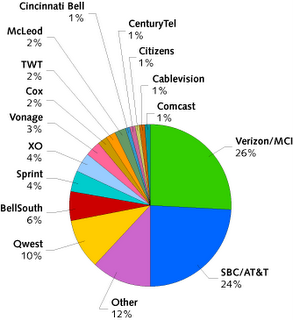 In the competitive local exchange carrier (CLEC) market of late has been the emergence of the cable companies and independent telcos and VoIP companies as providers with noticeable revenue share. In the early 1990s, it was believed that the primary competitors to the incumbent telcos would be other newly-formed telcos. Instead, it turns out to be cable companies and VoIP providers, not "CLECs with Class 5 switches."
In the competitive local exchange carrier (CLEC) market of late has been the emergence of the cable companies and independent telcos and VoIP companies as providers with noticeable revenue share. In the early 1990s, it was believed that the primary competitors to the incumbent telcos would be other newly-formed telcos. Instead, it turns out to be cable companies and VoIP providers, not "CLECs with Class 5 switches."Wireless also is an unanticipated force, to the extent that untethered and mobile communications are in some cases a direct substitute for landline services.
To be sure the term always has been a bit imprecise. Many Internet Service Providers get CLEC status just to buy access circuits at lower cost, for example, and aren't retail providers of telecom services in the classic sense. But the framework used to create the Telecom Act of 1996 clearly turns out to have come at a time when the whole communications business was about to morph in any case. It isn't simply the World Wide Web, the Internet or IP communications. Once also has the fusing of broadcasting, print, cable TV and common carrier regulatory models. At one end "network neutrality" is an impermissible interference with the right of free speech. At the other end it is a guarantee against discrimination. Neither model works well for the sort of world we are entering.
So the larger issue isn't simply "what is a CLEC?". The more important issue is "what is a broadcaster, publisher or common carrier?".

No comments:
Post a Comment